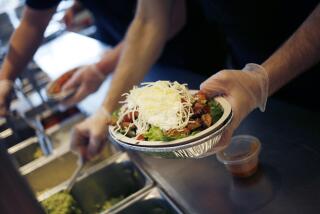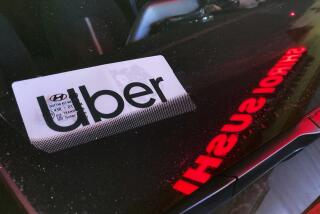Some Bottlers Are Increasing Prices on Premium Sodas
- Share via
The beverage industry, which has enticed Americans with premium beers, premium liquors and premium mineral waters in order to bolster profits, is seeking to apply the same lucrative strategy to the nation’s best-selling beverages: soft drinks.
On March 31, General Cinema Corp., PepsiCo. Inc.’s largest independent bottler, began charging retailers 10 cents more for six-packs and jumbo bottles of its Diet Pepsi and Slice sodas in Miami, Winston-Salem, N.C., Dayton-Springfield, Ohio, and Roanoke, Va. The company, which bottles about 10% of Pepsi products in the United States, plans to extend its new pricing policy to 14 other markets by the end of May.
The new price policy, which is supported by the bottling association presidents for Coke and Pepsi, came only days after Coca-Cola Bottling Co. of Miami raised diet-drink prices by 72 cents a case, or 3 cents a can.
The president of the Coca-Cola Bottling Co. of Los Angeles, Bill Adams, supports the concept of two-tiered pricing but said he has not made a decision whether to implement it.
Bottlers are free to charge retailers anything they want for their sodas. Yet unlike other premium beverages pitched to affluent or status conscious consumers, soft drinks have remained America’s preeminent mass market product because pricing has been kept fairly low and uniform, experts say. Pricing has been kept low by competition and pressure from the soft-drink companies that supply the syrup bottlers use.
Not Currently Planned
For instance Pepsico, which owns and operates Pepsi’s Los Angeles bottling franchise, says it has no plans to institute a two-tiered pricing system at any of its bottling plants. Those plants control about 25% of Pepsi’s soft-drink business.
But independent bottlers favor price differentials because diet and juice-based products cost more to make than regular sugar-sweetened colas. Pepsi bottlers pay about 26 cents per case more for syrup sweetened with low-calorie NutraSweet, and 30 cents per case more for Slice syrup with 10% fruit juice, industry sources say. Coca-Cola charges similar premiums for syrup for its diet sodas and Minute Maid juice-based drinks.
In addition, fruit juice-based soft drinks incur higher production costs because assembly lines must be shut down periodically to flush the filling systems when switching from a cola to a different flavor. “Diet products and juice-added products cost more per case to produce than regular products such as brand Pepsi,” said Robert J. Tarr Jr., president and chief operating officer of General Cinema. “This is because of the higher ingredient costs, higher packaging and special manufacturing and distribution considerations.”
Diet colas sweetened with NutraSweet are among the nation’s most popular soft drinks. Diet Coke and Diet Pepsi last year registered more than twice the percentage increase in sales as the second-fastest growing brand, Sprite, according to Beverage World magazine. Juice-based products, which now account for about 3% of all soft-drink sales, are expected to grow to about 15% of the market by 1990, industry officials predict.
But Coca-Cola and Pepsico officials fear the products may fall from favor if two-tiered pricing spreads. They say consumers, who have had little time to develop much brand loyalty to the year-old juice-based drinks and fledgling NutraSweet colas, will defect to cheaper brands if prices rise.
When 50 Coke and Pepsi bottlers tried to institute dual pricing in 1973 after the price of sugar skyrocketed, consumers balked. But some bottlers believe that the outcome may be different this time.
For one thing, observes Los Angeles’ Adams, consumers of flavored soft drinks are a lot more loyal than fickle cola drinkers, who often buy whatever cola is on sale. In addition, Pepsi and Coke will have more to gain from two-tiered pricing this time, since they have been buying up their bottling franchises recently.
More to Read
Inside the business of entertainment
The Wide Shot brings you news, analysis and insights on everything from streaming wars to production — and what it all means for the future.
You may occasionally receive promotional content from the Los Angeles Times.










